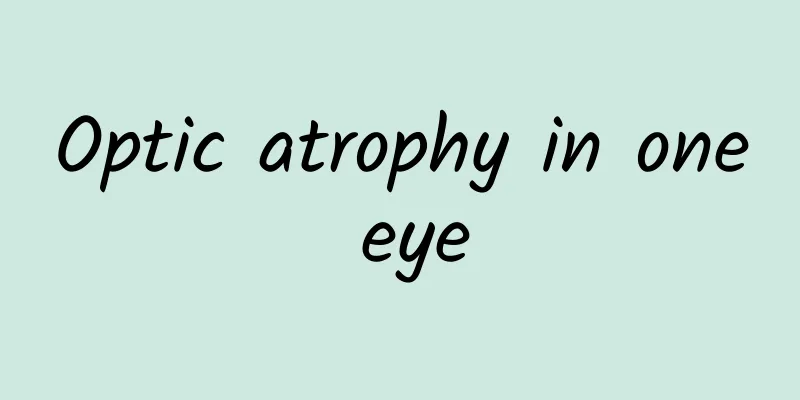Optic atrophy in one eye

|
Optic atrophy is generally divided into three types according to the cause: primary optic atrophy, secondary optic atrophy and intracranial lesions. Optic nerve atrophy can cause visual impairment, vision loss, and optic disc paleness. If you can't see clearly, it will have a great impact on your daily life, so active treatment is needed. There are two specific treatment methods: treating the cause and using drugs. 1. Causes 1. Primary optic atrophy It is often caused by retrobulbar neuritis, hereditary optic neuropathy (Leber's disease), orbital tumor compression, trauma, neurotoxins, etc. These lesions occur at the back of the eye. 2. Secondary optic atrophy Common ones include papillitis, optic disc edema, retinal choroiditis, retinitis pigmentosa, central retinal artery occlusion, quinine poisoning, ischemic optic disc disease, glaucoma, etc. 3. Intracranial lesions Intracranial inflammation, such as tuberculous meningitis or chiasmatic arachnoiditis, can cause descending optic atrophy. If the inflammation spreads to the optic disc, it can manifest as secondary optic atrophy. The increased intracranial pressure caused by intracranial tumors can cause papilledema and then form secondary optic atrophy. 2. Clinical manifestations The main symptoms are decreased vision and gray or pale optic disc. When the nerve fiber layer around the optic disc is damaged, a slit-shaped or wedge-shaped defect may appear. The former becomes darker, indicating exposure of the retinal pigment layer; the latter becomes redder, indicating exposure of the choroid. If the lesion occurs in the upper and lower edges of the optic disc, it is easier to identify because the nerve fiber layer in this area is particularly thickened. If the lesion is far away from the optic disc, it is difficult to find because the nerve fiber layer in these areas is thinner. Focal atrophy around the optic disc often indicates a lesion in the nerve fiber layer, which is caused by thinning of the nerve fiber layer in this area. Although it can be detected by funduscopy, it is easier to detect with a red-free ophthalmoscope and fundus photography. There are usually 9 to 10 small blood vessels in the optic disc. If the optic nerve atrophies, the number of these small blood vessels will decrease. At the same time, thinning, stenosis and occlusion of the retinal arteries may be seen. Optic atrophy is divided into primary and secondary types: in the former, the optic disc has clear boundaries, and the physiological depression and cribriform plate are visible; in the latter, the boundaries are blurred, and the physiological depression and cribriform plate are not visible. Treatment 1. Treatment of the cause Once the optic nerve atrophies, it is almost impossible to heal it, but it is entirely possible for its remaining nerve fibers to recover or maintain their function. Therefore, patients should be encouraged to have confidence and persist in treatment. 2. Medication Commonly used ones include neurotrophic drugs such as vitamin B1, B12, ATP and coenzyme A, vasodilators and blood circulation and blood stasis drugs such as niacin, dibazole, vitamin E, vinca, compound salvia miltiorrhiza, etc. In recent years, certain effects have been achieved through hyperbaric oxygen, external counterpulsation, acupuncture injection of 654-2, etc. |
<<: One eye sees things distorted
Recommend
What to eat when you have a stomachache
Stomachache is a common condition in our body, an...
Guizhi Fuling Pills
Medicine is very helpful in treating diseases, an...
Is Meniere's syndrome hereditary? Experts answer
Some of the common causes of Meniere's syndro...
What are the symptoms of damp heat in children?
Children especially like to eat all kinds of heav...
How to treat choice phobia and make a firm choice
Patients with decision phobia are often afraid to...
Black marks on the lumbar spine of the child's back
Young children may develop some black marks on th...
Low number of intermediate cells
In daily life, it is difficult for people to avoi...
Cefazolin Sodium Instructions
Cefazolin sodium is a relatively common drug in r...
What are the symptoms of acute appendicitis?
Appendicitis is a relatively common disease in da...
Why do I feel my hands are shaking?
Hand tremors are very common. For example, when w...
38 weeks baby moves very vigorously
It is normal for the baby to have frequent fetal ...
What are the symptoms of cervical radiculopathy?
The common symptoms of radiculopathy are differen...
How to choose Chinese patent medicine for spermatorrhea, impotence and premature ejaculation
Nocturnal emission refers to the spontaneous disc...
Can scars be exposed to the sun?
When scars appear, you must be aware of some tabo...
My stomach hurts and I have blood in my stool. What's wrong?
Stomach pain often leads to diarrhea, but sometim...









